-
 Bitcoin
Bitcoin $84,705.5206
1.96% -
 Ethereum
Ethereum $1,882.8342
2.59% -
 Tether USDt
Tether USDt $0.9999
-0.02% -
 XRP
XRP $2.1020
-0.02% -
 BNB
BNB $603.8511
-0.82% -
 Solana
Solana $124.7702
-1.25% -
 USDC
USDC $0.9999
-0.01% -
 Dogecoin
Dogecoin $0.1717
1.76% -
 Cardano
Cardano $0.6717
0.25% -
 TRON
TRON $0.2380
0.73% -
 Toncoin
Toncoin $3.9856
-3.94% -
 Chainlink
Chainlink $13.7866
0.95% -
 UNUS SED LEO
UNUS SED LEO $9.4087
2.25% -
 Stellar
Stellar $0.2691
1.18% -
 Avalanche
Avalanche $19.3533
1.55% -
 Sui
Sui $2.3689
0.72% -
 Shiba Inu
Shiba Inu $0.0...01244
-1.74% -
 Hedera
Hedera $0.1666
1.40% -
 Polkadot
Polkadot $4.1088
0.73% -
 Litecoin
Litecoin $83.2182
-0.74% -
 MANTRA
MANTRA $6.2222
-1.29% -
 Bitcoin Cash
Bitcoin Cash $306.0723
0.08% -
 Bitget Token
Bitget Token $4.6091
0.13% -
 Dai
Dai $1.0000
0.02% -
 Ethena USDe
Ethena USDe $0.9999
-0.01% -
 Pi
Pi $0.6919
-3.31% -
 Hyperliquid
Hyperliquid $13.1957
-3.08% -
 Monero
Monero $219.3099
1.05% -
 Uniswap
Uniswap $6.1691
2.09% -
 Pepe
Pepe $0.0...07614
3.60%
How to ensure high availability of mining nodes for IPFS mining?
High IPFS mining node availability demands robust infrastructure, including redundant internet, enterprise-grade hardware, regular updates, and geographically diverse deployments, minimizing downtime and maximizing profitability.
Mar 25, 2025 at 06:08 pm

How to Ensure High Availability of Mining Nodes for IPFS Mining?
IPFS mining, while promising, requires robust infrastructure to ensure consistent operation and maximize profitability. High availability of your mining node is crucial for reaping the rewards. This means minimizing downtime and maintaining consistent participation in the network. Several factors contribute to achieving this, and addressing them proactively is key.
Network Connectivity is Paramount
A reliable internet connection is the bedrock of any successful IPFS mining operation. Intermittent connectivity leads to dropped connections, missed opportunities to store and retrieve data, and ultimately, reduced rewards. Consider a dedicated, high-bandwidth connection with a redundant backup. This protects against outages from your primary provider. Explore options like multiple ISPs or cellular backups for ultimate resilience.
Hardware Reliability: The Foundation of Stability
The hardware powering your IPFS node is vital. A failing hard drive or insufficient RAM can cripple your operation. Invest in high-quality, enterprise-grade hardware known for its reliability and longevity. Regular hardware maintenance, including checks for errors and temperature monitoring, is essential. Redundancy through RAID configurations for storage ensures data protection against hardware failures.
Software and Operating System Updates
Keeping your software and operating system up-to-date is crucial. Updates often include critical security patches and performance improvements. Outdated software leaves your node vulnerable to exploits and may impact its performance, reducing its effectiveness and potentially causing downtime. Implement a regular update schedule to minimize vulnerabilities.
Proper Node Configuration and Monitoring
Incorrectly configured nodes can suffer from performance issues or even complete failure. Carefully review and optimize your node’s configuration settings, ensuring sufficient resources are allocated and parameters are correctly set. Utilize monitoring tools to track your node’s performance, resource usage, and overall health. This allows for proactive identification and resolution of potential problems before they cause significant downtime.
Geographic Location and Disaster Recovery
The geographic location of your node influences its availability. Areas prone to natural disasters or power outages pose a greater risk. Consider deploying your nodes in multiple geographically diverse locations to mitigate the risk of widespread outages. Implement a disaster recovery plan, including backups and failover mechanisms, to ensure your operation continues even in unforeseen circumstances.
Power Supply and Backup Solutions
Consistent power is non-negotiable. Power outages can disrupt your mining operation, leading to lost revenue and potential data corruption. Invest in a robust uninterruptible power supply (UPS) to provide backup power during outages. Consider a generator for longer outages, providing sufficient time to safely shut down your node or switch to a backup location.
Security Measures to Prevent Downtime
Security breaches can render your node unusable. Implement strong security measures, including firewalls, intrusion detection systems, and regular security audits. Keep your software updated and use strong passwords to prevent unauthorized access. Regular backups are essential to recover from security incidents or accidental data loss.
Scalability and Future-Proofing Your Setup
As your IPFS mining operation grows, so should your infrastructure. Plan for scalability from the outset. Invest in infrastructure that can handle increasing demands and consider cloud-based solutions for greater flexibility and scalability. Regularly review your setup to ensure it meets your evolving needs.
Choosing the Right IPFS Mining Software
Different IPFS mining software offers varying features and performance levels. Choose software that is well-maintained, reliable, and offers features relevant to your needs. Consider factors like ease of use, performance, and community support when making your selection.
Common Questions and Answers:
Q: What are the most common causes of IPFS node downtime?
A: Common causes include network connectivity issues, hardware failures (hard drives, RAM, etc.), software bugs or vulnerabilities, power outages, and security breaches.
Q: How can I monitor my IPFS node's health and performance?
A: Use monitoring tools that track resource usage (CPU, RAM, disk I/O), network connectivity, and overall node health. Many dedicated IPFS monitoring tools are available.
Q: What is the importance of redundancy in IPFS mining?
A: Redundancy (multiple network connections, RAID storage, backup power) protects against single points of failure. If one component fails, others take over, ensuring continued operation.
Q: How can I protect my IPFS node from security threats?
A: Implement firewalls, intrusion detection systems, keep software updated, use strong passwords, and conduct regular security audits to minimize vulnerability.
Q: What is the role of geographic diversity in ensuring high availability?
A: Distributing nodes across different geographic locations reduces the risk of widespread outages caused by regional events (natural disasters, power outages).
Q: How important is a good internet connection for IPFS mining?
A: A stable, high-bandwidth internet connection is critical. Interruptions lead to lost opportunities to store and retrieve data, impacting your mining rewards. Consider multiple ISPs for redundancy.
Q: What are the benefits of using enterprise-grade hardware for IPFS mining?
A: Enterprise-grade hardware offers better reliability, longevity, and performance compared to consumer-grade hardware, reducing the risk of downtime and maximizing your mining efficiency.
Q: What steps should I take if my IPFS node goes down?
A: First, diagnose the cause (network, hardware, software). If a hardware failure is detected, replace the failed component. If software related, check for updates and address any configuration errors. If network related, troubleshoot your internet connection or switch to your backup.
Q: How often should I back up my IPFS node data?
A: Regular backups are crucial. The frequency depends on your data volume and risk tolerance, but daily or at least weekly backups are recommended.
Q: Are there any cloud-based solutions for IPFS mining that enhance availability?
A: Yes, several cloud providers offer infrastructure solutions ideal for running IPFS nodes. These offer scalability, redundancy, and geographic diversity, enhancing availability. However, cost is a factor to consider.
Disclaimer:info@kdj.com
The information provided is not trading advice. kdj.com does not assume any responsibility for any investments made based on the information provided in this article. Cryptocurrencies are highly volatile and it is highly recommended that you invest with caution after thorough research!
If you believe that the content used on this website infringes your copyright, please contact us immediately (info@kdj.com) and we will delete it promptly.
- Santiment Released Data Offering Insights for Spotting Market Dips
- 2025-04-02 11:35:12
- Have You Ever Wondered What It Would Be Like to Invest in the Next Big Meme Coin Before It Skyrockets?
- 2025-04-02 11:35:12
- Circle, the company behind the USDC stablecoin, has filed for an initial public offering and plans to list its shares on the New York Stock Exchange
- 2025-04-02 11:30:12
- Circle, the company behind USDC stablecoin, has filed for an initial public offering and plans to list on the New York Stock Exchange
- 2025-04-02 11:30:12
- Circle, the company behind the USDC stablecoin, has filed for an initial public offering and plans to list on the New York Stock Exchange.
- 2025-04-02 11:25:12
- Hyperliquid's Centralized Twist Exposes the Paradox of Decentralized Finance
- 2025-04-02 11:25:12
Related knowledge

What is DeFi mining and how is it different from traditional mining?
Apr 02,2025 at 09:50am
DeFi mining, also known as yield farming or liquidity mining, is a process within the decentralized finance (DeFi) ecosystem where users provide liquidity to decentralized platforms in exchange for rewards. Unlike traditional mining, which involves solving complex mathematical problems to validate transactions and add them to a blockchain, DeFi mining f...
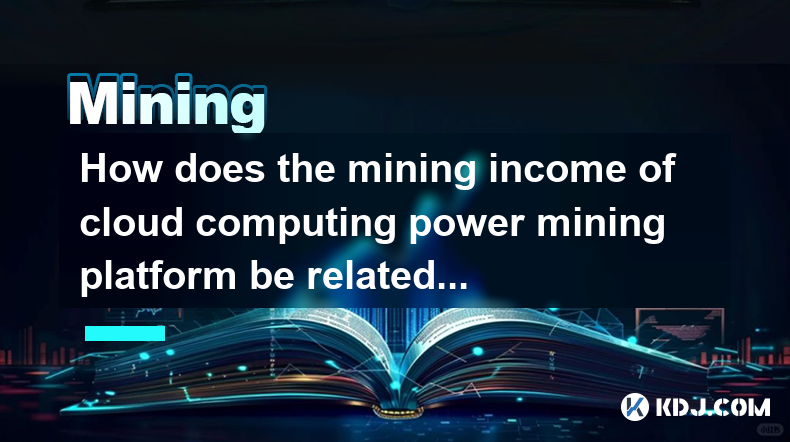
How does the mining income of cloud computing power mining platform be related to mining pool allocation?
Apr 02,2025 at 01:56am
The relationship between the mining income of a cloud computing power mining platform and the allocation of mining pools is a crucial aspect of cryptocurrency mining. Mining income is influenced by various factors such as the efficiency of the mining hardware, electricity costs, and the specific cryptocurrency being mined. However, the allocation of min...
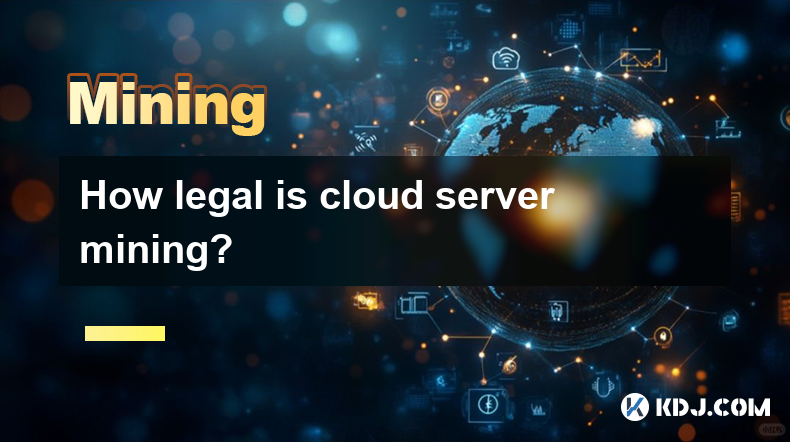
How legal is cloud server mining?
Apr 01,2025 at 08:08am
Cloud server mining has become an increasingly popular method for individuals and companies to participate in cryptocurrency mining without the need for expensive hardware and high electricity costs. However, the legality of cloud server mining can be a complex issue, as it varies by jurisdiction and depends on several factors. This article will explore...
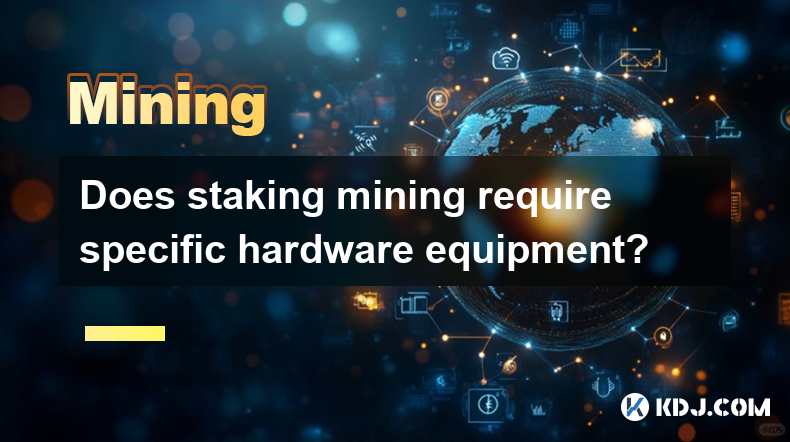
Does staking mining require specific hardware equipment?
Apr 02,2025 at 08:21am
Staking mining, often referred to simply as staking, is a process used by various cryptocurrencies to secure their networks and validate transactions. Unlike traditional mining, which often requires specialized hardware like ASICs (Application-Specific Integrated Circuits) or high-performance GPUs (Graphics Processing Units), staking typically does not ...
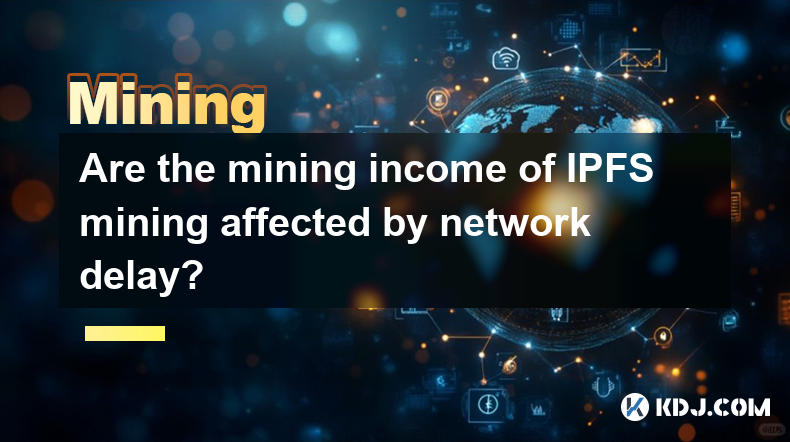
Are the mining income of IPFS mining affected by network delay?
Apr 01,2025 at 09:36pm
Are the Mining Incomes of IPFS Mining Affected by Network Delay? Understanding IPFS Mining and Network Delay's ImpactIPFS (InterPlanetary File System) mining, unlike Bitcoin mining, doesn't involve solving complex cryptographic puzzles. Instead, it focuses on providing storage and bandwidth to the network. Miners earn rewards for storing and sharing dat...
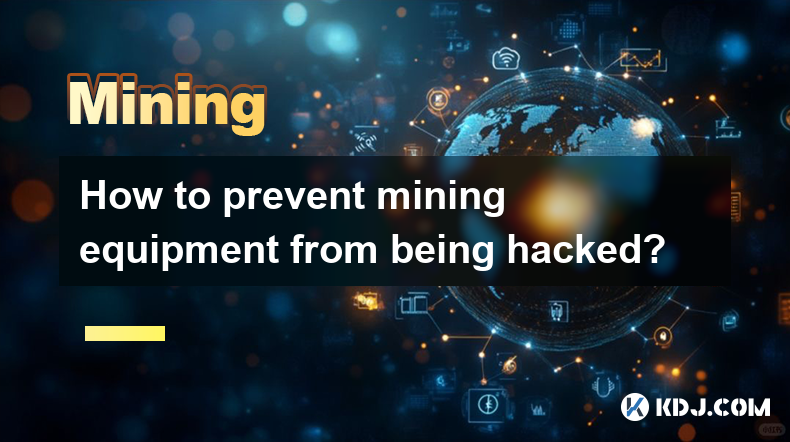
How to prevent mining equipment from being hacked?
Apr 01,2025 at 06:22am
Understanding the ThreatsCryptocurrency mining, while potentially lucrative, exposes your equipment to various cyber threats. These threats range from simple malware infections that steal your mining profits to sophisticated attacks that hijack your entire operation. Understanding these threats is the first step in effective protection. This includes r...

What is DeFi mining and how is it different from traditional mining?
Apr 02,2025 at 09:50am
DeFi mining, also known as yield farming or liquidity mining, is a process within the decentralized finance (DeFi) ecosystem where users provide liquidity to decentralized platforms in exchange for rewards. Unlike traditional mining, which involves solving complex mathematical problems to validate transactions and add them to a blockchain, DeFi mining f...

How does the mining income of cloud computing power mining platform be related to mining pool allocation?
Apr 02,2025 at 01:56am
The relationship between the mining income of a cloud computing power mining platform and the allocation of mining pools is a crucial aspect of cryptocurrency mining. Mining income is influenced by various factors such as the efficiency of the mining hardware, electricity costs, and the specific cryptocurrency being mined. However, the allocation of min...

How legal is cloud server mining?
Apr 01,2025 at 08:08am
Cloud server mining has become an increasingly popular method for individuals and companies to participate in cryptocurrency mining without the need for expensive hardware and high electricity costs. However, the legality of cloud server mining can be a complex issue, as it varies by jurisdiction and depends on several factors. This article will explore...

Does staking mining require specific hardware equipment?
Apr 02,2025 at 08:21am
Staking mining, often referred to simply as staking, is a process used by various cryptocurrencies to secure their networks and validate transactions. Unlike traditional mining, which often requires specialized hardware like ASICs (Application-Specific Integrated Circuits) or high-performance GPUs (Graphics Processing Units), staking typically does not ...

Are the mining income of IPFS mining affected by network delay?
Apr 01,2025 at 09:36pm
Are the Mining Incomes of IPFS Mining Affected by Network Delay? Understanding IPFS Mining and Network Delay's ImpactIPFS (InterPlanetary File System) mining, unlike Bitcoin mining, doesn't involve solving complex cryptographic puzzles. Instead, it focuses on providing storage and bandwidth to the network. Miners earn rewards for storing and sharing dat...

How to prevent mining equipment from being hacked?
Apr 01,2025 at 06:22am
Understanding the ThreatsCryptocurrency mining, while potentially lucrative, exposes your equipment to various cyber threats. These threats range from simple malware infections that steal your mining profits to sophisticated attacks that hijack your entire operation. Understanding these threats is the first step in effective protection. This includes r...
See all articles






















































































